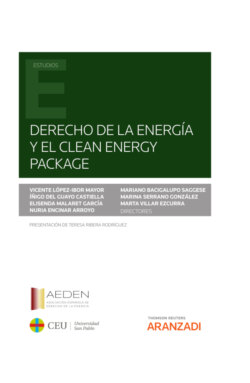Читать книгу Derecho de la energía y el clean energy package - Elisenda Malaret García - Страница 14
На сайте Литреса книга снята с продажи.
II. HISTORICAL OVERVIEW – THE FIRST FIVE PHASES OF THE EU’S ENERGY POLICY
ОглавлениеThe energy policy has been present from the first day of the creation of the European Communities, i.e. the European Coal and Steel Community (1952), the European Atomic Energy Community and the European Economic Community (1958) and finds its legal basis in the primary law and in the secondary law of the European Communities.
With regard to its content, we can distinguish six (6) phases in the evolution of the energy policy and energy law:
1. the phase of the creation of the Communities, during which the main source of energy was coal (80%), then (after 1958) imported oil and ultimately nuclear power.
2. the common policy phase from 1964 onwards, during which, due to increasing competition between the different forms of energy, there was an attempt to coordinate policies within the three European communities ECSC, EAEC and EEC.
3. the phase of the reaction of the European Communities to the oil crisis of 1973 and 1979. At that time, it was decided to make a shift in the energy policy of the European Communities in order to reduce the dependence on oil.
4. the phase of the creation of a real internal energy market in the more general context of the creation of an internal market within the EC which was undertaken by the Single European Act (1987) and the Treaty of Maastricht (1992/1993). The latter added to the EC Treaty (TEC), as a Community objective, “measures in the area of energy” (Article 3, point u) TEC) and introduced new provisions on Τrans-European Νetworks in the areas of (transport, telecommunications and) energy infrastructures (Articles 154 to 156 TEC) and the protection of the environment with regard to energy (Articles 174 to 176 TEC)2. The provision of Article 100 TEC on severe difficulties in the supply of certain products is closely related3. Moreover, it is worth noting that, the area of energy law was also subject to the so-called horizontal provisions of the EC Treaty4.
5. the Lisbon Treaty phase, which, on the one hand, preserves the EU’s competence in the area of energy, as a shared competence expressly defined in article 4 (2), i) TFEU, and, on the other hand, introduces into the TFUE for the first time a special chapter on a Union energy policy (Article 194 TFEU), while maintaining the other provisions in the area of energy.
Pursuant to Article 194 (1) TFEU and “in a spirit of solidarity between the Member States”, the EU energy policy sets the following four (4) objectives (“in the context of the establishment and functioning of the internal market and with regard for the need to preserve and improve the environment”): a) ensure the functioning of the energy market, b) ensure the security of energy supply in the Union, c) promote energy efficiency and energy saving and the development of new and renewable forms of energy and d) promote the interconnection of energy networks.
Furthermore, Article 194 (2) sub-paragraph (b) TFEU, specifies that the adoption of legislative measures by the Union aiming to achieve the four objectives mentioned in paragraph 1 TFEU shall not affect [a] a Member State’s right to determine the conditions for exploiting its energy resources, [b] its choice between different energy sources and [c] the general structure of its energy supply. Consequently, in these three areas, the sovereignty of the State is more marked, almost absolute, since the national State alone is competent to take decisions on these three questions. Thus, the said objectives are set, for the first time at the level of a Treaty, expressly and generally for the whole of the energy field and no longer fall within the competence of the common law legislator. The fourth objective, the interconnection of energy networks, covers the objectives included in the provisions on Trans-European Networks of this same Treaty.
The Lisbon Treaty preserves the provisions on Τrans-European Νetworks (Articles 170 to 172 TFEU), the provisions on the protection of the environment, including those on energy (Articles 191 to 193 TFEU)5 and the provision enabling the Council to take measures appropriate to the economic situation, in particular if severe difficulties arise in the supply of certain products, “notably in the area of energy” (Article 122 TFEU)6.
Moreover, as mentioned above, the horizontal provisions of the TFEU are also applicable in the area of energy7.
